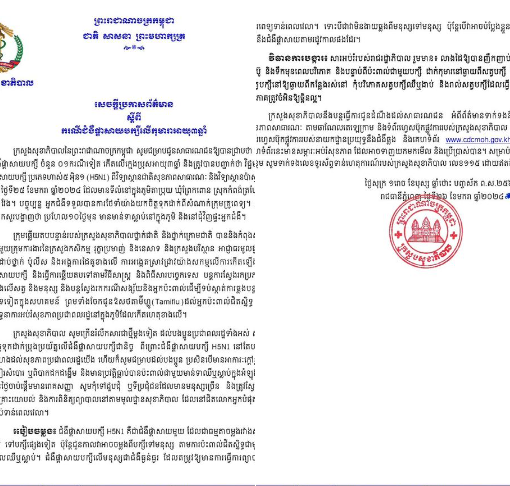
#17,880
Overnight the Cambodian MOH posted an announcement on their Facebook page (see below) indicating that they have detected another H5N1 infection - the first of 2024 and the 7th in the past 12 months - this time in a 3 y.o. boy who is currently being treated in the ICU.It is worth noting that this case is being reported from Prey Veng province, which reported 2 cases in 2023 (one in October and another in February). Four other cases were reported in 2023 after a 9 year hiatus.
As with the previous 6 cases, this is most likely another clade 2.3.2.1c H5N1 infection - an older lineage of avian flu which predates our current clade 2.3.4.4b epizootic.
The translation of today's announcement follows. I'll have a postscript after the break.
Kingdom of Cambodia, Nation, Religion, King
Ministry of Health
Press Release
The Ministry of Health of the Kingdom of Cambodia would like to inform the public that there is another case of bird flu in a 3-year-old boy and was confirmed positive for H5N1 bird flu virus from the National Institute. Public Health and Institut Pasteur du Cambodge on January 25, 2024, located in Ta Bruy village, Prek Poun commune, Kampong Trabek district, Prey Veng province. The patient is currently receiving intensive care from a team of doctors. According to inquiries, about 10 days ago, there were dead chickens in the village and around the patient's house.
The National and Sub-National Emergency Response Team of the Ministry of Health has been cooperating with the working groups of the Ministry of Agriculture, Forestry and Fisheries and the Ministry of Environment, local authorities at all levels, the police and partner organizations, to actively investigate the occurrence of Avian Influenza will respond to methods and technical protocols, continue to search for sources of transmission in both animals and humans, and continue to search for suspected and affected cases to prevent the spread of the disease to others in the community, as well as distribute Tamergo. Educate the health of the people in the village where the incident took place.
The Ministry of Health would like to remind all citizens to be careful about bird flu because H5N1 bird flu continues to threaten the health of our people and also would like to inform you if there are symptoms. Fever, cough, runny nose or shortness of breath and a history of contact with sick or dead chickens during the 14 days before the onset of symptoms, do not visit crowded places or seek consultation and examination. Get treatment at the nearest health facility as soon as possible.
Transmission: H5N1 bird flu is a flu virus that is usually transmitted from sick birds to other birds, but can sometimes be transmitted from birds to humans through close contact with sick or dead birds. Avian influenza in humans is a serious disease that requires treatment at Hospital on time. Although it is not easily transmitted from person to person, if it can metabolize it can be as contagious as the seasonal flu.Preventive measures: Government education messages include: Wash hands frequently with soap and water before eating and after contact with birds, keep children away from birds and keep birds away from living, do not eat birds. Sick or dead and all birds made for eating must be well cooked.The Ministry of Health will continue to inform the public about information related to public health issues through the Telegram Channel and the official Facebook page of the Ministry of Health, as well as the official Facebook page of the Department of Infectious Diseases and the website www.cdcmoh.gov.kh, which has Health education materials that can be downloaded, viewed and used. For more information, please contact the Ministry of Health Hotline 115 for free.Friday, January 1, 2024, Phnom Penh, January 26, 2024Rochak King sauteOffice of the Ministry of Health, Lot 80, Samdech Pen Nuth (St. 289), Phnom Penh Tel: Fax: (855-23) 885 970/884 909
While the reasons behind this sudden resurgence after 9 years remain a mystery, a recent study (see Preprint: A Timely Survey of Knowledge, Attitudes, and Practices Related to Avian Influenza (H5N1) in Rural, Cambodia) found very lax attitudes regarding avian flu among the rural population (e.g. 23% of participants cooked sick or dead poultries for their families).
Despite our recent preoccupation with HPAI H5N1 clade 2.3.4.4b, which has been spreading with remarkable speed via migratory birds for the past couple of years, HPAI H5Nx viruses remain a diverse, and evolving threat.
All of which makes this resurgence of clade 2.3.2.1c infections very much worthy of our attention.
